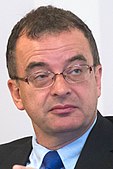2019 Barcelona City Council election
| |||||||||||||||||||||||||||||||||||||||||||||||||||||||||||||
All 41 seats in the Barcelona City Council 21 seats needed for a majority | |||||||||||||||||||||||||||||||||||||||||||||||||||||||||||||
|---|---|---|---|---|---|---|---|---|---|---|---|---|---|---|---|---|---|---|---|---|---|---|---|---|---|---|---|---|---|---|---|---|---|---|---|---|---|---|---|---|---|---|---|---|---|---|---|---|---|---|---|---|---|---|---|---|---|---|---|---|---|
| Opinion polls | |||||||||||||||||||||||||||||||||||||||||||||||||||||||||||||
| |||||||||||||||||||||||||||||||||||||||||||||||||||||||||||||
| |||||||||||||||||||||||||||||||||||||||||||||||||||||||||||||
The 2019 Barcelona City Council election is expected to be held on Sunday, 26 May 2019, to elect the 11th Barcelona City Council, the unicameral local legislature of the municipality of Barcelona. At stake will be all 41 seats in the City Council, determining the Mayor of Barcelona.
According to article 42.3 of the Spanish Electoral Law, local elections are held every 4 years on the fourth Sunday of May.[1]
Electoral system
The number of seats in the Barcelona City Council is determined by the population count. According to the municipal electoral law, the population-seat relationship on each municipality is to be established on the following scale:
| Inhabitants | Seats |
|---|---|
| <100 | 3 |
| 101–250 | 5 |
| 251–1,000 | 7 |
| 1,001–2,000 | 9 |
| 2,001–5,000 | 11 |
| 5,001–10,000 | 13 |
| 10,001–20,000 | 17 |
| 20,001–50,000 | 21 |
| 50,001–100,000 | 25 |
Additionally, for populations greater than 100,000, 1 seat is to be added per each 100,000 inhabitants or fraction, according to the most updated census data, and adding 1 more seat if the resulting seat count gives an even number. As the updated population census for the 2015 election is around 1,600,000, the Barcelona City Council size is set to 41 seats.
All City Council members are elected in a single multi-member district, consisting of the Barcelona municipality, using the D'Hondt method and a closed-list proportional representation system. Voting is on the basis of universal suffrage in a secret ballot. Only lists polling above 5% of valid votes in all of the municipality (which include blank ballots—for none of the above) are entitled to enter the seat distribution.
The Spanish municipal electoral law establishes a clause stating that, if no candidate is to gather an absolute majority of votes to be elected as mayor of a municipality, the candidate of the most-voted party will be automatically elected to the post.[1]
Opinion polls
Vote
Poll results are listed in the table below in reverse chronological order, showing the most recent first. The highest percentage figure in each polling survey is displayed in bold, and the background shaded in the leading party's colour. In the instance that there is a tie, then no figure is shaded. The lead column on the right shows the percentage-point difference between the two parties with the highest figures. Poll results use the date the survey's fieldwork was done, as opposed to the date of publication. However, if such date is unknown, the date of publication will be given instead.
| Polling Firm/Link | Last Date of Polling |
Margin of Error |
Sample Size |
Lead | |||||||
|---|---|---|---|---|---|---|---|---|---|---|---|
| style="background:Template:Barcelona en Comú/meta/color;"| | style="background:Template:Democratic Convergence of Catalonia/meta/color;"| | style="background:Template:Citizens (Spanish political party)/meta/color;"| | style="background:Template:Republican Left of Catalonia/meta/color;"| | style="background:Template:Socialists' Party of Catalonia/meta/color;"| | style="background:Template:People's Party of Catalonia/meta/color;"| | style="background:Template:Popular Unity Candidacy/meta/color;"| | |||||
| NC Report | May 29, 2016 | 22.6 | 19.2 | 13.4 | 12.7 | 11.3 | 9.1 | 7.9 | style="background:Template:Barcelona en Comú/meta/color; color:white;"| 3.4 | ||
| General Election | December 20, 2015 | 26.6 | 14.5 | 13.1 | 15.2 | 13.2 | 12.7 | style="background:Template:Barcelona en Comú/meta/color; color:white;"| 11.4 | |||
| NC Report | August 8, 2015 | 20.9 | 17.5 | 14.3 | 11.1 | 10.9 | 8.2 | 9.5 | ±3.8 pp | 900 | style="background:Template:Barcelona en Comú/meta/color; color:white;"| 3.4 |
| Municipal Election | May 24, 2015 | 25.2 | 22.8 | 11.0 | 11.0 | 9.6 | 8.7 | 7.4 | style="background:Template:Barcelona en Comú/meta/color; color:white;"| 2.4 | ||
Seat projections
Opinion polls showing seat projections are displayed in the table below. The highest seat figures in each polling survey have their background shaded in the leading party's colour. In the instance that there is a tie, then no figure is shaded. 21 seats are required for an absolute majority in the Barcelona City Council.
| Polling Firm/Link | Last Date of Polling |
||||||||
|---|---|---|---|---|---|---|---|---|---|
| style="background:Template:Barcelona en Comú/meta/color;"| | style="background:Template:Democratic Convergence of Catalonia/meta/color;"| | style="background:Template:Citizens (Spanish political party)/meta/color;"| | style="background:Template:Republican Left of Catalonia/meta/color;"| | style="background:Template:Socialists' Party of Catalonia/meta/color;"| | style="background:Template:People's Party of Catalonia/meta/color;"| | style="background:Template:Popular Unity Candidacy/meta/color;"| | |||
| NC Report | May 29, 2016 | 10 | 8 | 6 | 5 | 5 | 4 | 3 | |
| NC Report | August 8, 2015 | 10 | 8 | 6 | 5 | 5 | 3 | 4 | |
| Municipal Election | May 24, 2015 | 11 | 10 | 5 | 5 | 4 | 3 | 3 | |






